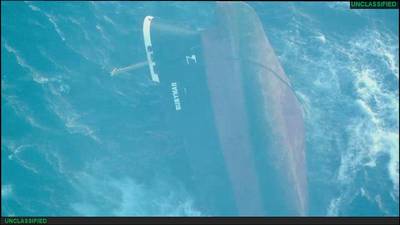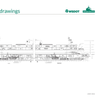Bulk Carrier Rubymar Sinks After Being Struck by Houthis it the Red Sea
The UK-owned Rubymar, attacked by Houthi militants last month, has sunk in the Red Sea, Yemen's internationally recognized government said on Saturday, warning of an "environmental catastrophe" from the ship's cargo of fertilizer.
The vessel is the first lost since the Houthis began targeting commercial shipping in November, forcing shipping firms to divert vessels on to the longer, more expensive route around southern Africa.
The Iranian-backed Houthis, who control the north of Yemen and other large centers, say they are acting in solidarity with Palestinians in Gaza.
Their attacks have prompted a series of strikes against their positions by the United States and Britain, and other navies to send vessels to the region to try to protect a vital trade route.
Italy's defense ministry said on Saturday one of its naval ships had shot down a drone flying towards it in the Red Sea.
The Houthi Transport Ministry, meanwhile, said there had been a "glitch" in undersea communication cables in the Red Sea as a result of actions by U.S. and British naval vessels. It did not give further details.
On Monday, a Yemeni government team visited the Rubymar, a Belize-flagged cargo ship, and said it was partially submerged. A government statement on Saturday said the ship had sunk in the southern Red Sea on Friday night.
The United States Central Command confirmed the sinking in a statement on social media platform X
The United Kingdom Maritime Trade Operations (UKMTO) agency on Saturday reported a ship sinking, but did not identify it.
The U.S. military previously said the attack had significantly damaged the freighter and caused an 18-mile (29-km) oil slick. The ship was carrying more than 41,000 metric tons of fertilizer when it came under attack, the U.S. military has said.
Ahmed Awad bin Mubarak, foreign minister in Yemen's internationally recognized government in Aden, said in a post on X: "The sinking of the Rubymar is an environmental catastrophe that Yemen and the region have never experienced before.
"It is a new tragedy for our country and our people. Every day we pay the price for the adventures of the Houthi militia ..."
The internationally recognized government, which is backed by Saudi Arabia, has been at war with the Houthis since 2014.
Marine life threatened
The release of such large amounts of fertilizer into the Red Sea poses a serious threat to marine life, said Ali Al-Sawalmih, director of the Marine Science Station at the University of Jordan.
The overload of nutrients can stimulate excessive growth of algae, using up so much oxygen that regular marine life cannot survive, said Al-Sawalmih, describing a process called eutrophication.
"An urgent plan should be adopted by countries of the Red Sea to establish monitoring agenda of the polluted areas in the Red Sea as well as adopt a cleanup strategy," he said.
The overall impact depends on how ocean currents deplete the fertilizer and how it is released from the stricken vessel, said Xingchen Tony Wang, assistant professor at the Department of Earth and Environmental Sciences at Boston College.
The ecosystem of the southern Red Sea features pristine coral reefs, coastal mangroves and diverse marine life.
Last year, the area avoided a potential environmental disaster when the United Nations removed more than 1 million barrels of oil from a decaying supertanker moored off the Yemen coast. That type of operation may be more difficult in the current circumstances.
The Houthi attacks have stoked fears that the Israel-Hamas war could spread, destabilizing the wider Middle East.
In a separate report, the UKMTO agency said it had received a report of a ship being attacked 15 nautical miles west of Yemen's port of Mokha.
"The crew took the vessel to anchor and were evacuated by military authorities," the UKMTO said in an advisory note.
(Reuters - Reporting by Mohammad Ghobari and Andrew Mills; Writing by Enas Alashray, Andrew Mills and Mark Potter; Editing by Jason Neely, Alison Williams and Giles Elgood)














